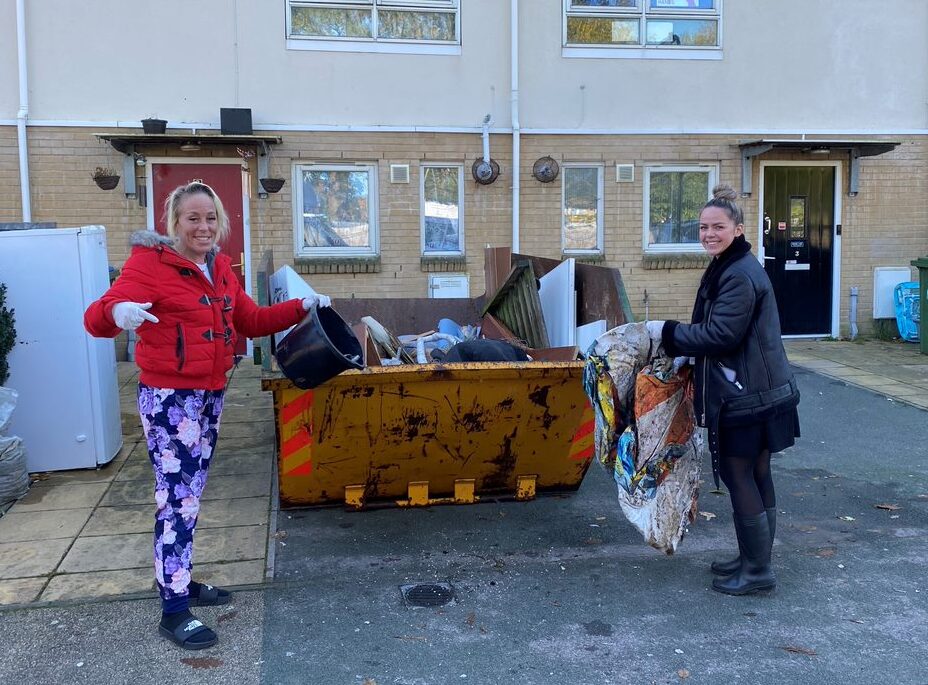In the latest of our series, Neil Merrick reports on how a housing association’s community action days combine tenant consultation and support with joint efforts to improve communal space.

The residents’ story
Three years ago, the green space opposite houses in Shinewell Gardens seemed neglected and unloved.
A children’s play area had been dismantled by Southampton City Council due to vandalism, while residents looked out on a scene of old mattresses, shopping trolleys and other rubbish.
Efforts to improve the area began with a community action day, organised by the housing association Abri, which owns most of the homes in the cul-de-sac. At the same time, residents were assisted to tidy up their front gardens.
Three years later, while the area is not immune from vandalism, the green space boasts a picnic bench, raised flower beds for flowers and herbs, and a ‘bug hotel’, generating interest in biodiversity. Worn-out fencing between the green area and a local school has been replaced.
Lucy Davis, Abri’s community development officer for the area, says the action day in late 2020 presented the opportunity to bring residents together and agree on a joint effort. “Most residents were unhappy with the neglected and misused green space,” she says. “I’m pleased we were able to clean up the area so that it’s more attractive.”
Why is green space important to residents?
Studies show that during the pandemic appreciation of parks and other green space rose significantly, particularly in urban areas. But, though valued, some areas are in poor condition, often strewn with litter.
In some cases, vandalism, other criminal activity and antisocial behaviour renders such green space unusable, even though residents are keen to have somewhere to relax and enjoy cleaner air.
What is a community action day?
The community action day at Shinewell Gardens took place in November 2020, as the UK moved in and out of lockdowns. In effect, it became a pilot for a programme of such days that Abri now holds in neighbourhoods across southern England.
The programme took off over the next two years as, post Covid, Abri recognised the need to become more customer facing. “Levels of satisfaction were down,” says Stephanie Stanley, an Abri community investment area manager. “Covid brought a lot of challenges in terms of visibility and it was vital for us to start having a two-way conversation with customers.”
“In some cases, vandalism, other criminal activity and antisocial behaviour renders such green space unusable, even though residents are keen to have somewhere to relax and enjoy cleaner air”
Residents are informed in advance that Abri staff will be in the area, with reminders sent out on the day via text. Essentially, tenants meet Abri employees over a cup of tea, flag up problems, including damp and mould, and request repairs.
An Abri ‘handyman’ attends each action day to deal with straightforward jobs. At the same time, staff offer advice on employment and benefits, including opportunities for volunteering.
The exact nature of the event partly depends on the location. In a quiet cul-de-sac, staff may erect a gazebo and put out tables and chairs. “If we create a bit of a buzz, more people come and talk to us,” says Stanley.
So are the days all about staff helping residents?
No. Abri is keen to avoid ‘us and them’ situations and stresses the need for tenants to participate where possible. This is especially important when it comes to looking after communal areas.
Rather than maintenance staff complete a job and leave, officers attempt to look into the root of a problem, such as how to prevent fly-tipping. “We try to establish why something is happening in the first place,” says Stephanie Stanley. “We don’t want to just come in cold and disappear.”
Danielle Lane, community development officer in Windsor, says residents welcome Abri’s “visible presence” in their area and wish to hear about what local services are available. Tenant feedback also benefits Abri as an organisation. “It helps us to understand current issues and work better with the community,” she adds.
How many community action days are held each year?

The number of action days is increasing. Last year, 18 were held for Abri residents across southern England, from Somerset to Berkshire. At least 25 are planned, or have already taken place, this year.
The increase is partly due to Abri taking over homes in Bracknell previously owned by Silvar Housing Association, bringing its total stock to more than 50,000 properties.
During the past two years, three quarters of action days were held in one of Abri’s 11 community investment zones – neighbourhoods identified as requiring extra support due to deprivation.
How did things work out in Shinewell Gardens?
Plans to place residents in charge of monitoring and maintaining the area opposite their homes in Shinewell Gardens were put on hold after a storage unit and water butt were vandalised, leading to tenants feeling disheartened.
But the community action day in 2020, and three subsequent ‘community days’, gave Lucy Davis and other Abri staff the opportunity to continue encouraging residents to keep their gardens clean and make the most of the green space.
“Ultimately the community action day gave me the platform to speak to residents at the same time. I was able to bring in a skip so we could clean up the area and listen to what residents wanted to improve,” says Davis. “If I’d spoken to them one by one, it wouldn’t have had the same effect.”
What other improvements have resulted from action days?
Rubbish clearance and the improvement of communal space are common features of community action days.
In Weymouth, Abri set up a short-term community investment plan after residents complained about problems caused by drug users. Staff gained a clearer picture by knocking on doors, leading to an area being identified where drug users congregated.
Abri used money from its social value procurement fund, plus materials donated by builders’ merchants Travis Perkins, to renew torn down fencing. The work was completed by a local contractor.
At Whitehill and Bordon, in Hampshire, Woolmer Forest Timebank joined a litter pick and clean up, filling three bags with items that would have otherwise gone to waste.
Action days also create opportunities for closer liaison with the police and local authorities. In Salisbury, a suggestion from a tenant led to the city council adding cricket for children to its planned pop-up youth events.
What lessons can be learnt from Abri’s community action days?

To be effective, a community action day must be properly publicised and have the support of a large number of residents. A landlord’s employees must be ready to not just respond to problems, but listen and learn.
At the same time, residents should play their part, keeping gardens tidy and assisting in making community areas more usable for everyone.
Under the new tenant satisfaction measures for social landlords in England, housing associations and local authorities must show they have policies in place to address concerns among residents about the quality of neighbourhoods.
“We are keen to create better living environments,” says Stephanie Stanley. “We provide assurance that Abri is interested in a problem, but resident involvement is crucial. We don’t want it to be a one-day event that ends there.”





















